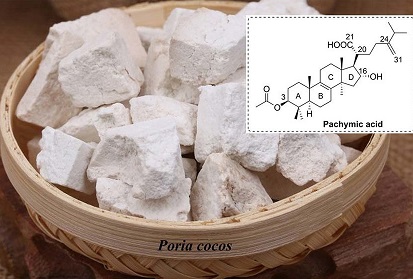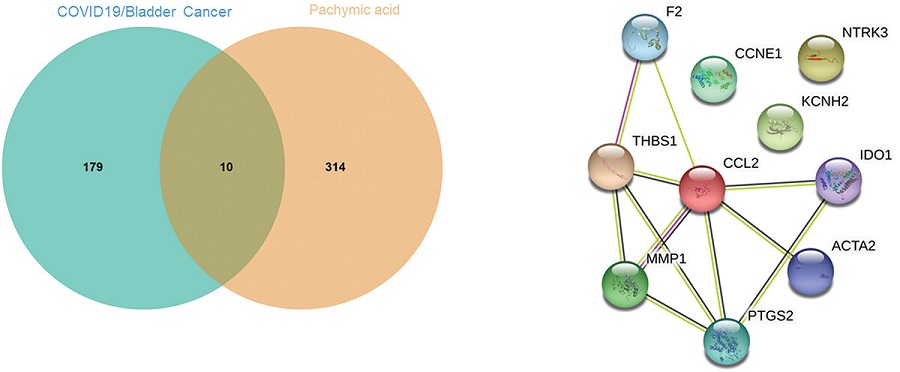Herbs-Phytochemicals: Study Finds That Pachymic Acid From Poria Cocos Can Treat Bladder Cancer As Well As COVID-19!
Nikhil Prasad Fact checked by:Thailand Medical News Team Sep 07, 2023 1 year, 7 months, 1 week, 6 days, 1 hour, 54 minutes ago
Herbs-Phytochemicals: In recent years, the world has faced two significant health challenges: incidences of bladder cancer which seems to be rising every year and the ongoing COVID-19 pandemic. Bladder cancer remains a formidable global health concern, while the novel coronavirus responsible for COVID-19 has caused widespread illness and mortality. A new study conducted by researchers from the Affiliated Hospital of Guilin Medical University in China and the University of Duisburg-Essen in Germany, sheds light on the potential of pachymic acid, a bioactive compound found in herbal mushroom Poria Cocos, as a treatment for both bladder cancer and COVID-19.
 The Current State of Bladder Cancer and COVID-19
The Current State of Bladder Cancer and COVID-19
COVID-19, caused by the severe acute respiratory syndrome coronavirus 2 (SARS-CoV-2), has posed a significant public health challenge worldwide. With a high rate of infection and rapid transmission, it has led to millions of deaths. Despite extensive research efforts, there is still no specific medicine to definitively cure COVID-19. Notably, individuals with pre-existing conditions, such as cancer, are more susceptible to SARS-CoV-2 infection due to immunosuppression caused by cancer treatments. Furthermore, cancer patients who contract COVID-19 often experience worse outcomes and higher mortality rates.
Bladder cancer, a leading cause of cancer-related deaths, is particularly relevant in this context. Bladder cancer patients are at an elevated risk of contracting SARS-CoV-2, potentially due to immune system alterations and the effects of cancer therapy. In China, bladder cancer ranks among the most prevalent malignancies, with a 5-year survival rate similar to that in Western countries.
Pachymic Acid: A Promising Bioactive Compound
Pachymic acid is a triterpenoid found in Poria Cocos Wolf, a medicinal mushroom with a history of use in traditional Chinese medicine for its hypoglycemic, sedative, and hypnotic properties. Recent preclinical studies have revealed that pachymic acid possesses anti-cancer properties, impacting various cancer types through multiple molecular mechanisms. For instance, it has been shown to regulate phosphatase and tensin homolog (PTEN) and induce caspase-dependent apoptosis in osteosarcoma. In lung cancer, pachymic acid modulates reactive oxygen species (ROS)-dependent c-Jun N-terminal kinase (JNK) and endoplasmic reticulum (ER) stress pathways.
A prior
Herbs-Phytochemicals study has also demonstrated the potential of pachymic acid in treating cystitis glandularis, an inflammatory condition of the bladder.
In vitro experiments have further substantiated its role in inhibiting the proliferation of human bladder cancer cells by inducing reactive oxygen species (ROS) generation and modulating Bcl-2 and inhibitor of apoptosis (IAP) family member expressions.
Network Pharmacology Approach
In the pursuit of understanding how pachymic acid can effectively combat both bladder cancer and COVID-19, researchers employed a network pharmacology approach. This methodology aimed to identify common, candidate, and core therapeutic targets associated with pachymic
acid's action against these conditions.
Key Findings in the Study
-
Differential Gene Expression: The study initially identified 1150 differentially expressed genes (DEGs) associated with bladder cancer and COVID-19. Subsequently, a risk score model was created, characterizing key genes associated with different risk groups.
-Pachymic Acid as a Potential Treatment: The research highlighted pachymic acid as a promising candidate for treating both bladder cancer and COVID-19. Network pharmacology analyses pinpointed ten key therapeutic targets for pachymic acid against these conditions.
-
Molecular Docking Results: Molecular docking simulations revealed that pachymic acid exhibited strong binding capabilities to key target proteins, including chemokine (CC-motif) ligand 2 (CCL2), thrombospondin-1 (THBS1), and matrix metallopeptidase 1 (MMP1) in SARS-CoV-2.
Enrichment Analysis: Gene ontology (GO) and Kyoto Encyclopedia of Genes and Genomes (KEGG) enrichment analyses shed light on the biological processes, molecular functions, and signaling pathways associated with the core target genes of pachymic acid. These pathways included the IL-17 signaling pathway, bladder cancer, malaria, COVID-19, p53 signaling pathway, and more.
 All 10 intersection targets of pachymic acid and bladder cancer/COVID-19 were identified. A PPI network of F2, IDO1, KCNH2, NTRK3, CCL2, PTGS2, ACTA2, MMP1, CCNE1, and THBS1 was presented.
All 10 intersection targets of pachymic acid and bladder cancer/COVID-19 were identified. A PPI network of F2, IDO1, KCNH2, NTRK3, CCL2, PTGS2, ACTA2, MMP1, CCNE1, and THBS1 was presented.
The findings of this study have far-reaching implications for both bladder cancer and COVID-19 treatment strategies. Bladder cancer patients, particularly those in advanced stages, often experience immune system alterations due to chemotherapy, making them more vulnerable to SARS-CoV-2 infection.
Consequently, they face a higher risk of severe COVID-19 and poorer prognoses.
The study's risk score model, based on DEGs, offers valuable insights into the prognosis of bladder cancer patients. Increased risk scores were associated with higher mortality rates, suggesting that these genes could serve as potential diagnostic markers for both bladder cancer and COVID-19.
Network pharmacology analyses identified ten core targets for pachymic acid against both diseases, providing a comprehensive view of its therapeutic potential. The subsequent molecular docking simulations demonstrated the compound's ability to bind effectively to crucial SARS-CoV-2 proteins, supporting its potential as a COVID-19 treatment.
Conclusion
In summary, this new research conducted by revealed pachymic acid's promising role in treating bladder cancer and COVID-19. The study's innovative approach combines bioinformatics, network pharmacology, and molecular docking to uncover potential therapeutic targets and mechanisms.
Pachymic acid, a natural compound, offers a multifaceted approach to combat these life-threatening conditions. By modulating immune responses, inhibiting viral replication, and targeting key proteins, pachymic acid holds significant promise for future clinical applications in the treatment of bladder cancer and COVID-19. However, further clinical verification and experimental validation are necessary to fully realize its potential as a therapeutic agent.
The study findings were published in the peer reviewed International Journal of Food Properties
https://www.tandfonline.com/doi/full/10.1080/10942912.2023.2252194
For the latest on
Herbs And Phytochemicals, keep on logging to Thailand Medical News.

